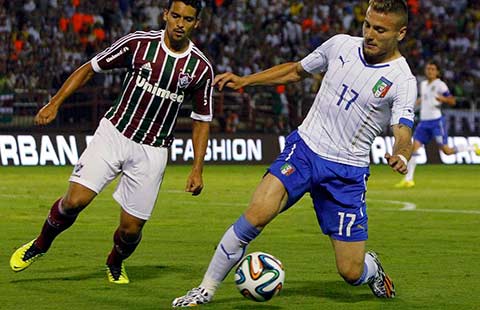Brazil's forgotten father of soccer
Updated: 2014-06-12 06:56
By Reuters in Sao Paulo (China Daily)
|
|||||||||||

Few tributes to Scot who kick-started nation's love affair with the game
To look at Charles Miller's grave, tucked away in a well-kept corner plot of a Sao Paulo cemetery, you would never suspect that here lies a man who has influenced the lives of hundreds of millions of people.
Miller is recognized as the man who brought soccer to Brazil, the spiritual home of the game, the only nation to win the World Cup five times and the host of this year's tournament.
But his grave is hidden behind a locked gate and there is no plaque or sign indicating that here lies one of Brazil's greatest sons.
"Very few people know that he's here," said cemetery administrator Claudemir Soares. "They see his grave and they're like, 'Wow!' Some people only recognize the name because there's a plaza named after him. They don't know who he is, so we have to explain it to them."
The son of a Scottish engineer and Brazilian mother who was born in Brazil and educated in England at the end of the 19th century, Miller finished boarding school in Southampton and arrived home at the port of Santos in 1894. He brought with him a ball, a pump, soccer boots and a rule book.
He was soon organizing matches and within a decade had set up Brazil's first league.
The first games were for expats, but Brazilians quickly fell in love with the sport. By the second decade of the 20th century they were playing internationals against Argentina and took part in the first World Cup in 1930.
Today, Brazil is not just the only nation to win the World Cup five times, it is home to arguably the greatest player (Pele), the most iconic stadium (Maracana) and the best ever national team, the 1970 World Cup-winning side.
Miller's place in all this is the subject of controversy.
Some argue soccer was played before he arrived back in Brazil, and there is little doubt others promoted the game.
Thomas Donohue, another Scot who helped organize five-a-side matches in a Rio de Janeiro textile factory six months before Miller came home, has a valid claim to Miller's crown.
However, Aidan Hamilton, the author of a book on the period, said there were three reasons Miller is celebrated as the father of the game in Brazil - a title he was first given in 1942 by two local journalists who interviewed him on the 40th anniversary of the founding of the first league.
Miller was an outstanding player, not just leading his team to Sao Paulo's first three official championships but also finishing as the top scorer. He was also an experienced organizer who helped start Brazil's first clubs and league and he was possibly the first player in the world to have a move named after him.
"A 1918 dictionary called it 'The Charles', the skill where the player bends his leg back and kicks the ball with his heel," Hamilton, author of the 1998 book An Entirely Different Game: The British Influence on Brazilian Football, said in a phone interview.
But in spite of that glorious past, Miller has been forgotten in recent years by all but the most fanatical supporters.
There is a Charles Miller Plaza in front of the Pacaembu stadium in Sao Paulo, but few other public tributes. There are no streets with his name outside Sao Paulo.
TUNE IN
(Beijing time)
Group A
Friday 04:00 Brazil vs Croatia CCTV-1, CCTV-5
(China Daily 06/12/2014 page24)
Today's Top News
FM: Iraq facing 'mortal threat' from militants
Li eyes closer economic ties on Europe trip
China becomes No 2 carbon trader
CPC requires 'prudent' recruitment
Comfort women history may enter UNESCO archives
Rivlin elected Israel's president
Quebec sees second jailbreak involving helicopter
Russia warns against military buildup by NATO
Hot Topics
Lunar probe , China growth forecasts, Emission rules get tougher, China seen through 'colored lens', International board,
Editor's Picks

|

|

|

|

|

|





